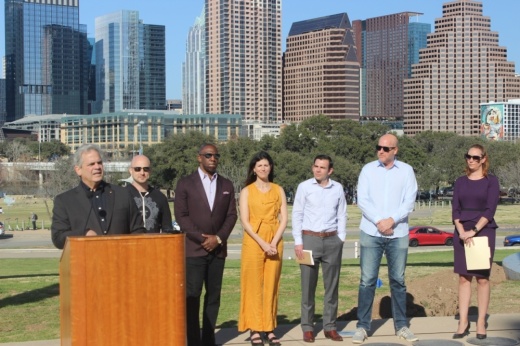Austin is seeking to boost its presence in the blockchain and Web3 development space and could begin using cryptocurrencies in regular city operations, officials said during a March press conference centered on the city's backing of the emerging tech systems.
Austin has already become a home for several blockchain and crypto-related businesses and events, and the city recently waded into the tech itself through work focused on managing the medical records of residents experiencing homelessness. Blockchains, globally linked digital data networks, have become prominent in recent years for data storage and transfers and are foundational for cryptocurrencies such as bitcoin.
Interest in blockchain, cryptocurrencies and Web3—a potential new blockchain-based version of the internet—has also grown in Texas as officials are seeking to further study, develop and promote the tech sector.
Mayor Steve Adler and District 6 Council Member Mackenzie Kelly were joined on March 10 by representatives from local tech, entrepreneurship and innovation groups to discuss Austin's role as a hub in the growing field. The pair also spoke to their hopes that the city can further evaluate the technology and potentially begin implementing blockchain in its own operations.
"Austin really wants to continue its tech role, wants to be a leader in helping to make it work. To really develop the intrinsic value, the applications that can be built on top of the protocols, actually making it something that impacts the daily lives of people that live in our city," Adler said.
Ahead of the conference, Adler and Kelly announced a pair of items related to the use of blockchain technology in Austin, which they plan to put to a vote at City Council's March 24 meeting. Both Kelly and Adler's proposals have already received support from others on the council dais.
The proposal from Adler is directed at ensuring Austin remains invested in the sector and explores its public benefits in a variety of fields, including a continued look into its use as a records system for homeless residents. His resolution also asks Austin to engage with local blockchain and crypto-centered tech events.
Kelly's resolution would launch a study of the tech's local possibilities for Austinites to use cryptocurrencies for city billing as well as investigations into how the tech could be utilized for public benefit and what Austin is allowed to do with blockchain and crypto.
"There are many possible municipal uses of cryptocurrency and blockchain technology. For example, residents could pay property taxes in bitcoin or other cryptocurrencies. The city could allow for a form of payment of city service fees in bitcoin. ... But we as leaders in the city cannot make the decision to do these things until we know more about state and local laws that might let us do so—or not do so," Kelly said.
Outside the city's own work, attendees at the March 10 event highlighted several other updates in the field that will be progressing this year. Among them: Brad Spies, managing director of the Consensus festival, noted the "logical step" of relocating the event from its longtime home in New York to Austin this June. Raphaela Sapire of City Magic said the organization will begin using blockchain to distribute $1,000 grants to Austin community members in a more streamlined way than traditional funding. And Joshua Baer, CEO of the downtown coworking space Capital Factory, said his group and the Stacks Foundation will spend a total of $1 million on a multiyear program aimed at drawing more tech companies to town.
Daniel Culotta, Austin's acting chief innovation officer, said the possible council action later this month comes as work in the blockchain and crypto fields continues to spike locally. And while the extent of Austin's own work in the space remains to be seen, he said the city is focused on finding the most effective and efficient uses for the tech.
"I honestly have no idea what the interfaces would look like or could look like; I think that’s one of the really exciting parts of this space right now. But we are committed to being really diligent, figuring out what are the best ways to use this type of technology in conjunction with others as we continue," Culotta said. "We have real principles of openness and accessibility and equity, and we will hold those at the center of this work and see where it takes us.”





